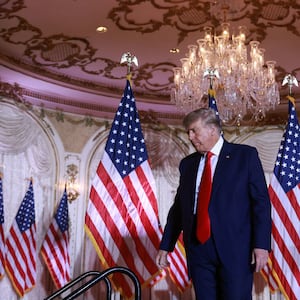Former President Donald Trump, faced with a New York attorney general who won’t back down, is finally being forced to come up with a defense to explain why he lied relentlessly about his real estate portfolio. Her gargantuan lawsuit could bankrupt his company—and pave the way for a future criminal prosecution.
His riches are being threatened by a powerful law enforcement tool that AG Letitia James is wielding like a sledgehammer. Her civil lawsuit against him and his family—which accuses them of rampant bank and tax fraud—relies on the state’s Executive Law 63 (12). Its potential to deal serious damage is evident by how desperately the former president has tried to avoid fighting it head-on.
Rather than present an actual defense, Trump has questioned for nearly a year whether that law even gives AG Letitia James the authority to target his family company. He’s failed miserably.
This month, he was shut down by a New York judge who threatened to sanction his lawyers over this issue. After being fined $1 million by a federal judge tired of his “frivolous” antics, Trump is now in full retreat. He withdrew a Florida lawsuit against James last week, and he dropped a similar one against her in New York on Tuesday.
Trump must now confront a legal weapon that could blow up his finances and end his family company, several former attorneys general and prosecutors told The Daily Beast.
“It’s the cornerstone statutory authority for an attorney general to launch investigations and initiate prosecutions. The language is broad. It talks about persistent fraud and illegality. She has the authority to protect the public from scammers,” said Bob Abrams, who served as New York attorney general from 1979 until 1993.
The law, as written, empowers the state’s top prosecutor to stop any business from engaging in “repeated fraudulent or illegal acts,” seeking potentially lucrative damages, and canceling its official business certificate.
James’ lawsuit, filed in September, seeks $250 million-plus and wants to revoke the Trump Organization’s business credentials—as well as bar it from borrowing from banks in what’s become the finance capital of the world.
Abrams said this latest effort by James is the natural culmination of a half-century that saw the role of the attorney general transformed from the defender of a state government to a Robin Hood looking out for the little guy. In fact, the state law she’s now using against Trump was central to that change. The law enforcement provision was the result of lobbying by one of her predecessors, Jacob K. Javits, who spent two years as the state’s AG before moving on to the U.S. Senate.
In 1956, The New York Times described how Javits celebrated what he called “powerful new weapons in his fight to prevent frauds against the public.” A decade later, then-AG Louis K. Lefkowitz wrote to the state’s constitutional convention about the importance of this law enforcement tool in guaranteeing the independence and effectiveness of that office. And a decade after that, historical documents show that legislators sharpened the tool by allowing prosecutors to seek damages.
New York’s top cop used it to strengthen cases against companies that duped people—like fly-by-night outfits that kept what investigators called “sucker lists” of people who could be tricked into a scam—sparking a wave of similar laws and cases across the country, according to several lawyers who worked in that office.
“We were pretty aggressive in how we used the power of the attorney general’s office to try and advance environmental rights, which became a very important objective in the AG’s office—as well as civil rights. And we also did a lot of consumer protection. There were so many abuses of consumer rights and scams. We prosecuted dozens of scams,” said G. Oliver Koppell, who served as New York’s AG in 1994.
But legal scholars noted that the current attorney general’s case is still breaking new ground; James is using the law in a way it hasn’t exactly been employed before.
In her case against the Trumps, the real estate family is accused of inflating the price of the properties they own to snag better bank loans under false pretenses—or in another instance, jacking up the estimated value of a forested estate donated to conservation in order to balloon a tax write-off. In court, her staff attorneys have laid out how banks and insurance companies were defrauded while taxpayers were left on the hook.
It only makes sense for James to employ the sledgehammer of Executive Law 63 (12) if “consumer protection” also means cracking down on fraud generally to ensure a fair marketplace, former prosecutors told The Daily Beast.
“It’s something of a stretch. I think the law was primarily intended to go after consumer fraud. When I was there, we certainly focused primarily on consumer fraud…. people who got [swindled] in the mail or were induced to buy things they didn’t need. We really didn’t look at it as a business fraud law,” Koppell said.
But the ex-AG said that James’ decision to employ a novel use of the law still abides by the spirit of the law, which is to crack down on criminality wherever it exists.
“I’m not opposed to it,” Koppell added.
In court last November, the team of attorneys representing Trump’s business interests in this case questioned why taxpayers should fund an expensive legal fight over alleged bank fraud when those same lenders—among them, Deutsche Bank—haven’t even complained. The argument was shrugged off by Justice Arthur F. Engoron, who is overseeing the case and who seemed receptive to the AG’s arguments that the office has a responsibility to clamp down on fraud. The judge himself pointed out the unbelievable extent of Trump’s lies, which included blatantly lying about the size of his Trump Tower penthouse and tripling its square footage.
In a subsequent order, Engoron pointed out just how powerful of a tool James is wielding. She can use it to snatch every penny Trump has made based on false representations, which includes the $10 million he made selling the Trump International Hotel Washington in the nation’s capital. And a source familiar with the investigation said the AG could also seize $200 million—the value of the nonexistent penthouse space Trump benefited from lying about.
In an order that seemed to poke at Trump’s tendency to stretch the bounds of reality, Engoron wrote that “Executive Law § 63 (12) broadly empowers the Attorney General of the State of New York to seek to remedy the deleterious effects, in both the public’s perception and in reality, on truth and fairness in commercial marketplaces and the business community.”
That case is steadily proceeding to trial, which is currently scheduled for October this year—just as Trump is set to ramp up his campaign to retake the White House.
Trump’s attempts to question the AG’s ability to use this law are particularly comical to lawyers who’ve been watching this latest case unfold—it’s already been used twice to shut down Trump enterprises.
The New York AG’s Office used it to takedown Trump University, a for-profit education scam that sold hopeful entrepreneurs on the promise of inside advice from Trump but instead had them take selfies next to his lifesize cardboard cutout. It used that same law to force Trump to shut down his charity, the Trump Foundation, after he used it to break campaign finance laws by funneling $25,000 to Florida’s top prosecutor at the time, Pam Bondi.
Those previous Trump failures are why the current fight seems like a solid win for the AG, said a lawyer familiar with the case who spoke on condition of anonymity.
“If the facts are against you, argue the law. If the law is against you, argue the facts. If the law and the facts are against you, pound the table,” they said, quoting the American poet Carl Sandburg.
“It is indeed a sweeping and powerful tool for the AG,” said Daniel L. Feldman, a professor at the City University of New York’s John Jay College of Criminal Justice. He wrote a chapter about that office and its use of the law in The Oxford Handbook of New York State Government and Politics.
Feldman surmised that the best defense Trump’s lawyers could put together at this point would be to argue that lying about real estate values is the norm.
“The only argument against the AG’s power to do this is that this kind of practice is so endemic to the real estate industry, so commonplace, that it’s actually an accepted practice… it’s a custom and tradition of that industry, therefore, it’s not really fraud,” Feldman said.
But those bigly lies won’t work either, he cautioned.
“Now, I don’t buy that for a few reasons. The fact that everybody does it doesn’t make it legal. Trump did it to an extent I’ve never heard of anyone doing it. The egregious exaggerations went way beyond other people,” he said.







